Foreign Expansions: Managing Human Resources in International Joint Ventures
VerifiedAdded on 2023/04/04
|15
|3204
|221
AI Summary
This document provides a comprehensive guide on managing human resources in international joint ventures. It covers recruitment and selection strategies, pre-departure training, and performance management during assignments. The document also explores specific cultural considerations for the United Kingdom, Turkey, and China.
Contribute Materials
Your contribution can guide someone’s learning journey. Share your
documents today.
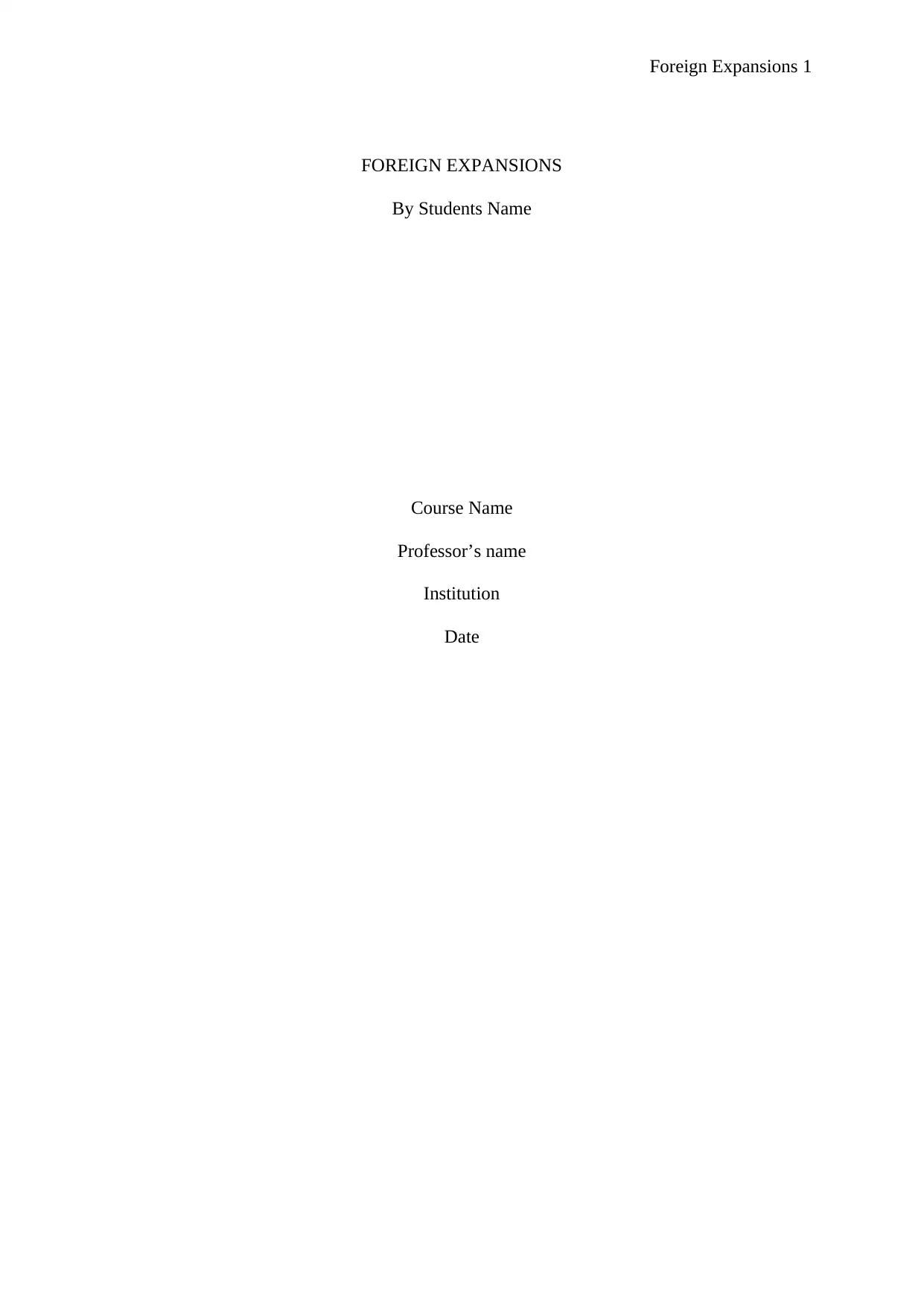
Foreign Expansions 1
FOREIGN EXPANSIONS
By Students Name
Course Name
Professor’s name
Institution
Date
FOREIGN EXPANSIONS
By Students Name
Course Name
Professor’s name
Institution
Date
Secure Best Marks with AI Grader
Need help grading? Try our AI Grader for instant feedback on your assignments.
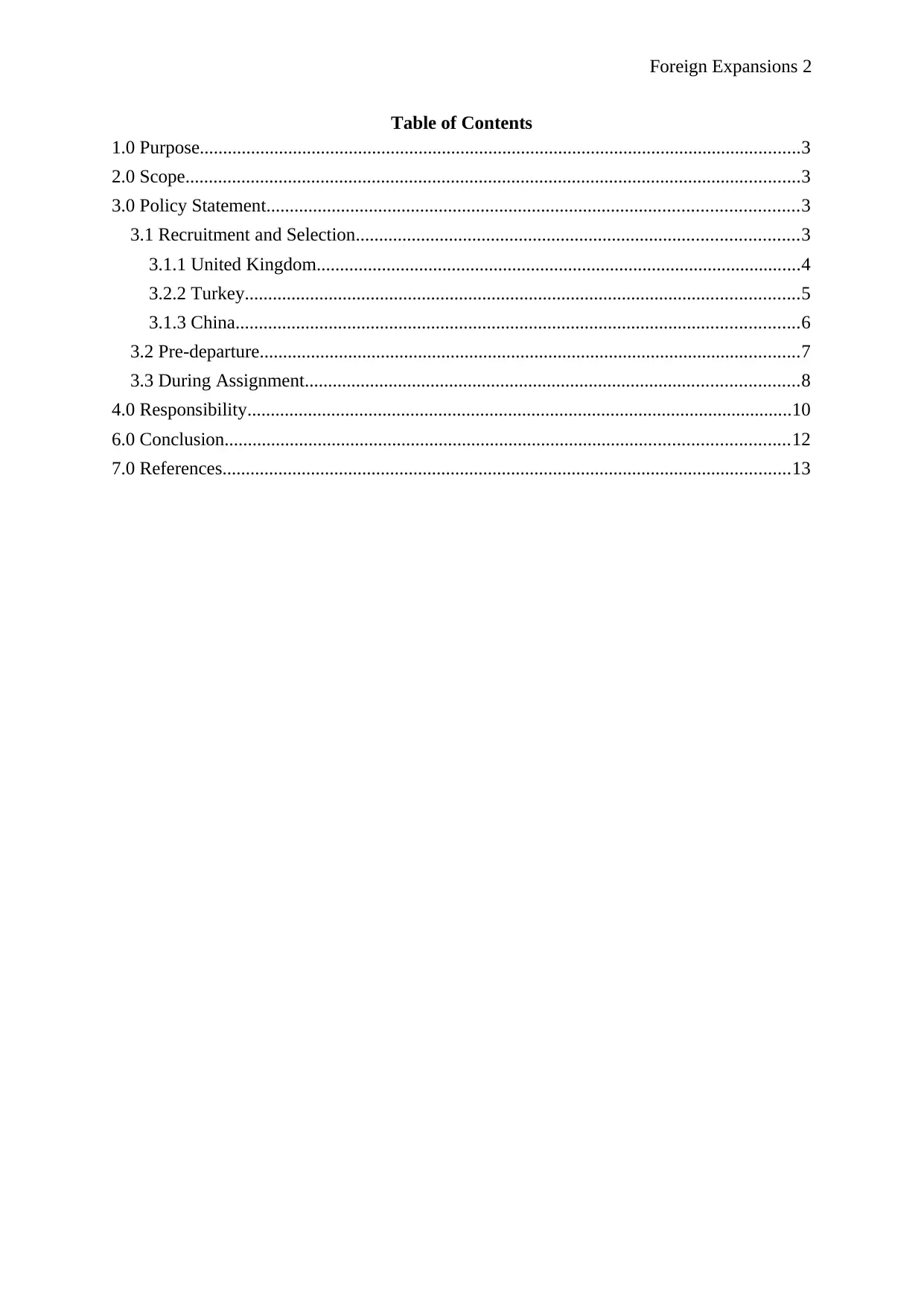
Foreign Expansions 2
Table of Contents
1.0 Purpose.................................................................................................................................3
2.0 Scope....................................................................................................................................3
3.0 Policy Statement..................................................................................................................3
3.1 Recruitment and Selection...............................................................................................3
3.1.1 United Kingdom........................................................................................................4
3.2.2 Turkey.......................................................................................................................5
3.1.3 China.........................................................................................................................6
3.2 Pre-departure....................................................................................................................7
3.3 During Assignment..........................................................................................................8
4.0 Responsibility.....................................................................................................................10
6.0 Conclusion.........................................................................................................................12
7.0 References..........................................................................................................................13
Table of Contents
1.0 Purpose.................................................................................................................................3
2.0 Scope....................................................................................................................................3
3.0 Policy Statement..................................................................................................................3
3.1 Recruitment and Selection...............................................................................................3
3.1.1 United Kingdom........................................................................................................4
3.2.2 Turkey.......................................................................................................................5
3.1.3 China.........................................................................................................................6
3.2 Pre-departure....................................................................................................................7
3.3 During Assignment..........................................................................................................8
4.0 Responsibility.....................................................................................................................10
6.0 Conclusion.........................................................................................................................12
7.0 References..........................................................................................................................13
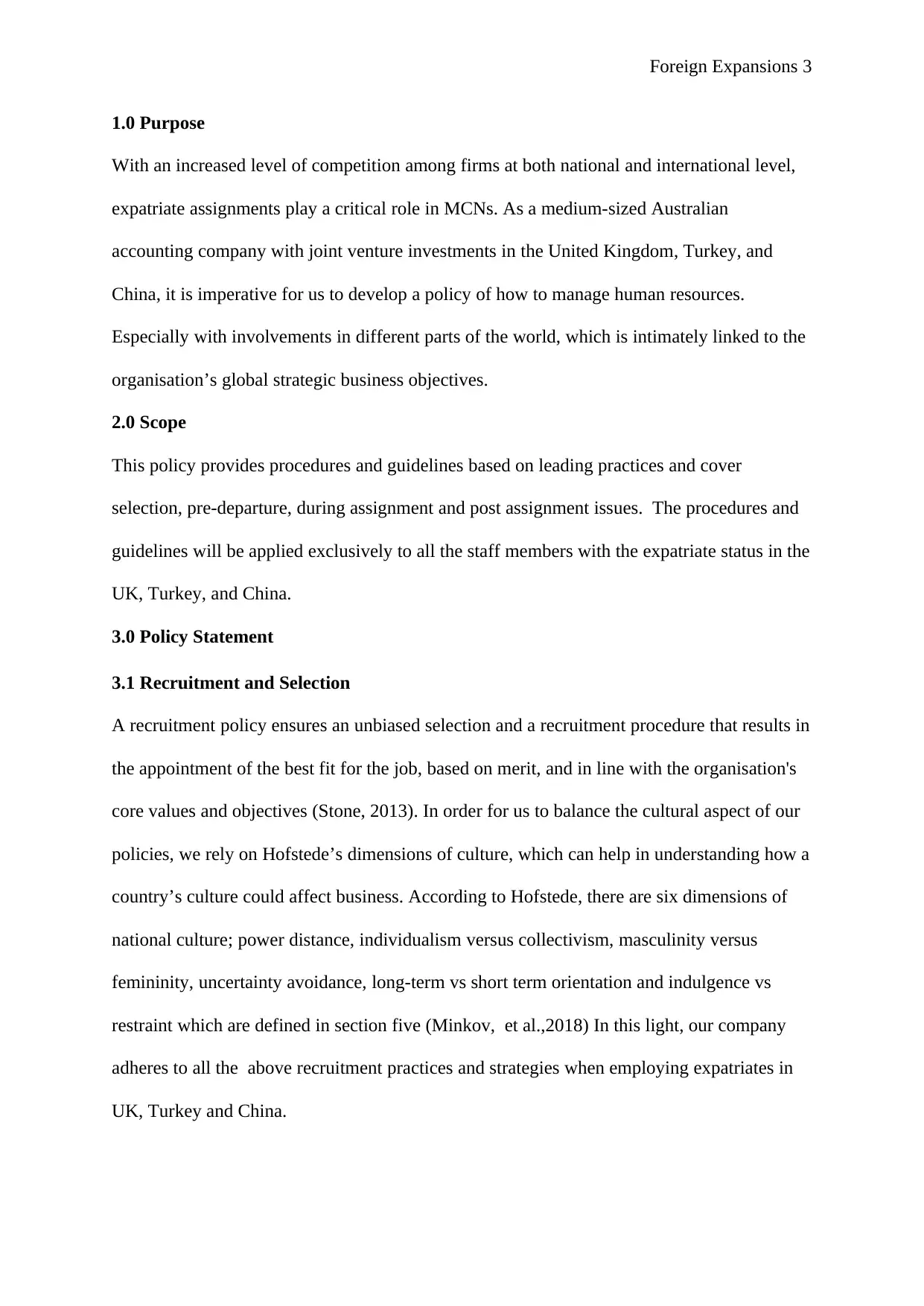
Foreign Expansions 3
1.0 Purpose
With an increased level of competition among firms at both national and international level,
expatriate assignments play a critical role in MCNs. As a medium-sized Australian
accounting company with joint venture investments in the United Kingdom, Turkey, and
China, it is imperative for us to develop a policy of how to manage human resources.
Especially with involvements in different parts of the world, which is intimately linked to the
organisation’s global strategic business objectives.
2.0 Scope
This policy provides procedures and guidelines based on leading practices and cover
selection, pre-departure, during assignment and post assignment issues. The procedures and
guidelines will be applied exclusively to all the staff members with the expatriate status in the
UK, Turkey, and China.
3.0 Policy Statement
3.1 Recruitment and Selection
A recruitment policy ensures an unbiased selection and a recruitment procedure that results in
the appointment of the best fit for the job, based on merit, and in line with the organisation's
core values and objectives (Stone, 2013). In order for us to balance the cultural aspect of our
policies, we rely on Hofstede’s dimensions of culture, which can help in understanding how a
country’s culture could affect business. According to Hofstede, there are six dimensions of
national culture; power distance, individualism versus collectivism, masculinity versus
femininity, uncertainty avoidance, long-term vs short term orientation and indulgence vs
restraint which are defined in section five (Minkov, et al.,2018) In this light, our company
adheres to all the above recruitment practices and strategies when employing expatriates in
UK, Turkey and China.
1.0 Purpose
With an increased level of competition among firms at both national and international level,
expatriate assignments play a critical role in MCNs. As a medium-sized Australian
accounting company with joint venture investments in the United Kingdom, Turkey, and
China, it is imperative for us to develop a policy of how to manage human resources.
Especially with involvements in different parts of the world, which is intimately linked to the
organisation’s global strategic business objectives.
2.0 Scope
This policy provides procedures and guidelines based on leading practices and cover
selection, pre-departure, during assignment and post assignment issues. The procedures and
guidelines will be applied exclusively to all the staff members with the expatriate status in the
UK, Turkey, and China.
3.0 Policy Statement
3.1 Recruitment and Selection
A recruitment policy ensures an unbiased selection and a recruitment procedure that results in
the appointment of the best fit for the job, based on merit, and in line with the organisation's
core values and objectives (Stone, 2013). In order for us to balance the cultural aspect of our
policies, we rely on Hofstede’s dimensions of culture, which can help in understanding how a
country’s culture could affect business. According to Hofstede, there are six dimensions of
national culture; power distance, individualism versus collectivism, masculinity versus
femininity, uncertainty avoidance, long-term vs short term orientation and indulgence vs
restraint which are defined in section five (Minkov, et al.,2018) In this light, our company
adheres to all the above recruitment practices and strategies when employing expatriates in
UK, Turkey and China.
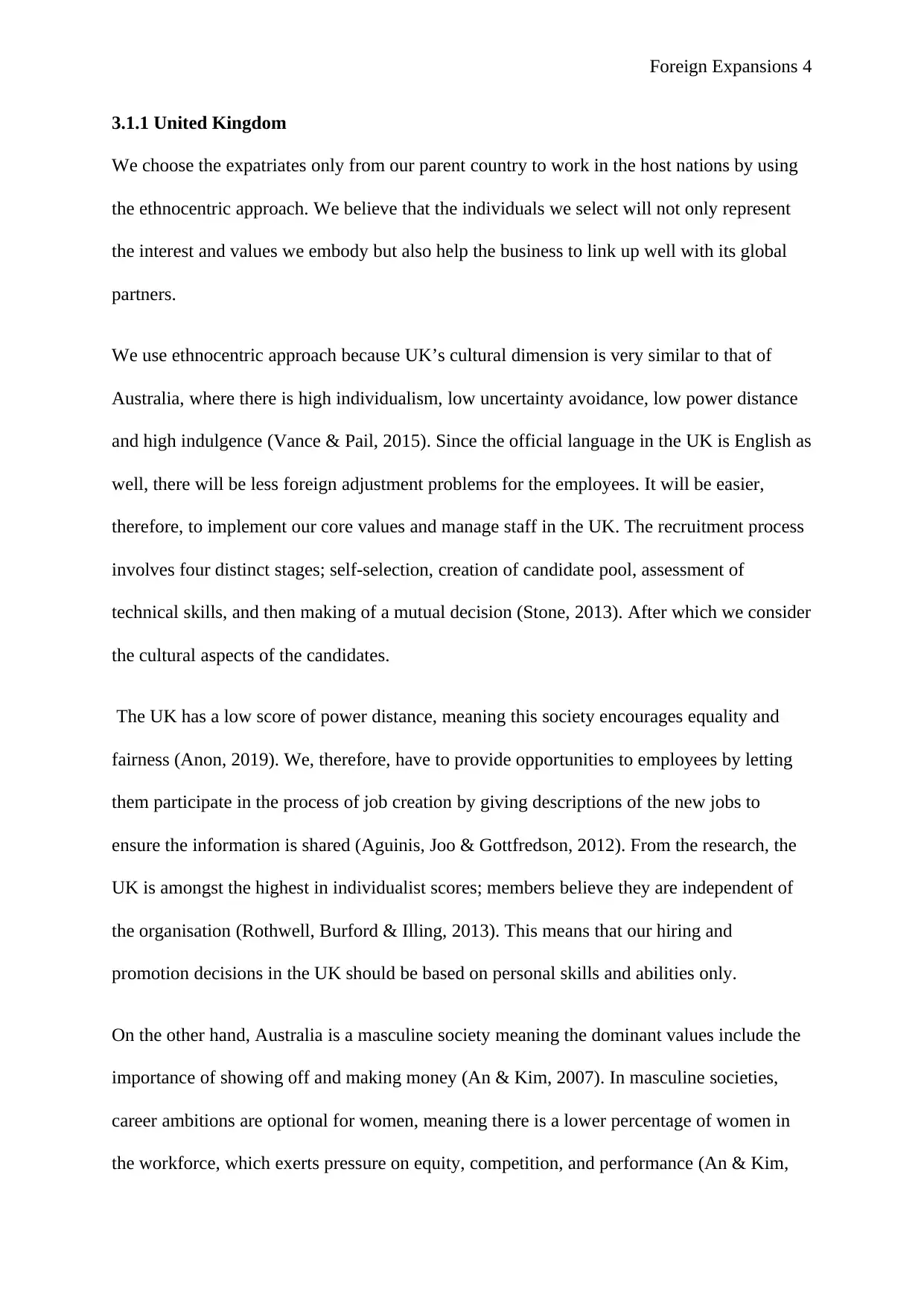
Foreign Expansions 4
3.1.1 United Kingdom
We choose the expatriates only from our parent country to work in the host nations by using
the ethnocentric approach. We believe that the individuals we select will not only represent
the interest and values we embody but also help the business to link up well with its global
partners.
We use ethnocentric approach because UK’s cultural dimension is very similar to that of
Australia, where there is high individualism, low uncertainty avoidance, low power distance
and high indulgence (Vance & Pail, 2015). Since the official language in the UK is English as
well, there will be less foreign adjustment problems for the employees. It will be easier,
therefore, to implement our core values and manage staff in the UK. The recruitment process
involves four distinct stages; self-selection, creation of candidate pool, assessment of
technical skills, and then making of a mutual decision (Stone, 2013). After which we consider
the cultural aspects of the candidates.
The UK has a low score of power distance, meaning this society encourages equality and
fairness (Anon, 2019). We, therefore, have to provide opportunities to employees by letting
them participate in the process of job creation by giving descriptions of the new jobs to
ensure the information is shared (Aguinis, Joo & Gottfredson, 2012). From the research, the
UK is amongst the highest in individualist scores; members believe they are independent of
the organisation (Rothwell, Burford & Illing, 2013). This means that our hiring and
promotion decisions in the UK should be based on personal skills and abilities only.
On the other hand, Australia is a masculine society meaning the dominant values include the
importance of showing off and making money (An & Kim, 2007). In masculine societies,
career ambitions are optional for women, meaning there is a lower percentage of women in
the workforce, which exerts pressure on equity, competition, and performance (An & Kim,
3.1.1 United Kingdom
We choose the expatriates only from our parent country to work in the host nations by using
the ethnocentric approach. We believe that the individuals we select will not only represent
the interest and values we embody but also help the business to link up well with its global
partners.
We use ethnocentric approach because UK’s cultural dimension is very similar to that of
Australia, where there is high individualism, low uncertainty avoidance, low power distance
and high indulgence (Vance & Pail, 2015). Since the official language in the UK is English as
well, there will be less foreign adjustment problems for the employees. It will be easier,
therefore, to implement our core values and manage staff in the UK. The recruitment process
involves four distinct stages; self-selection, creation of candidate pool, assessment of
technical skills, and then making of a mutual decision (Stone, 2013). After which we consider
the cultural aspects of the candidates.
The UK has a low score of power distance, meaning this society encourages equality and
fairness (Anon, 2019). We, therefore, have to provide opportunities to employees by letting
them participate in the process of job creation by giving descriptions of the new jobs to
ensure the information is shared (Aguinis, Joo & Gottfredson, 2012). From the research, the
UK is amongst the highest in individualist scores; members believe they are independent of
the organisation (Rothwell, Burford & Illing, 2013). This means that our hiring and
promotion decisions in the UK should be based on personal skills and abilities only.
On the other hand, Australia is a masculine society meaning the dominant values include the
importance of showing off and making money (An & Kim, 2007). In masculine societies,
career ambitions are optional for women, meaning there is a lower percentage of women in
the workforce, which exerts pressure on equity, competition, and performance (An & Kim,
Secure Best Marks with AI Grader
Need help grading? Try our AI Grader for instant feedback on your assignments.
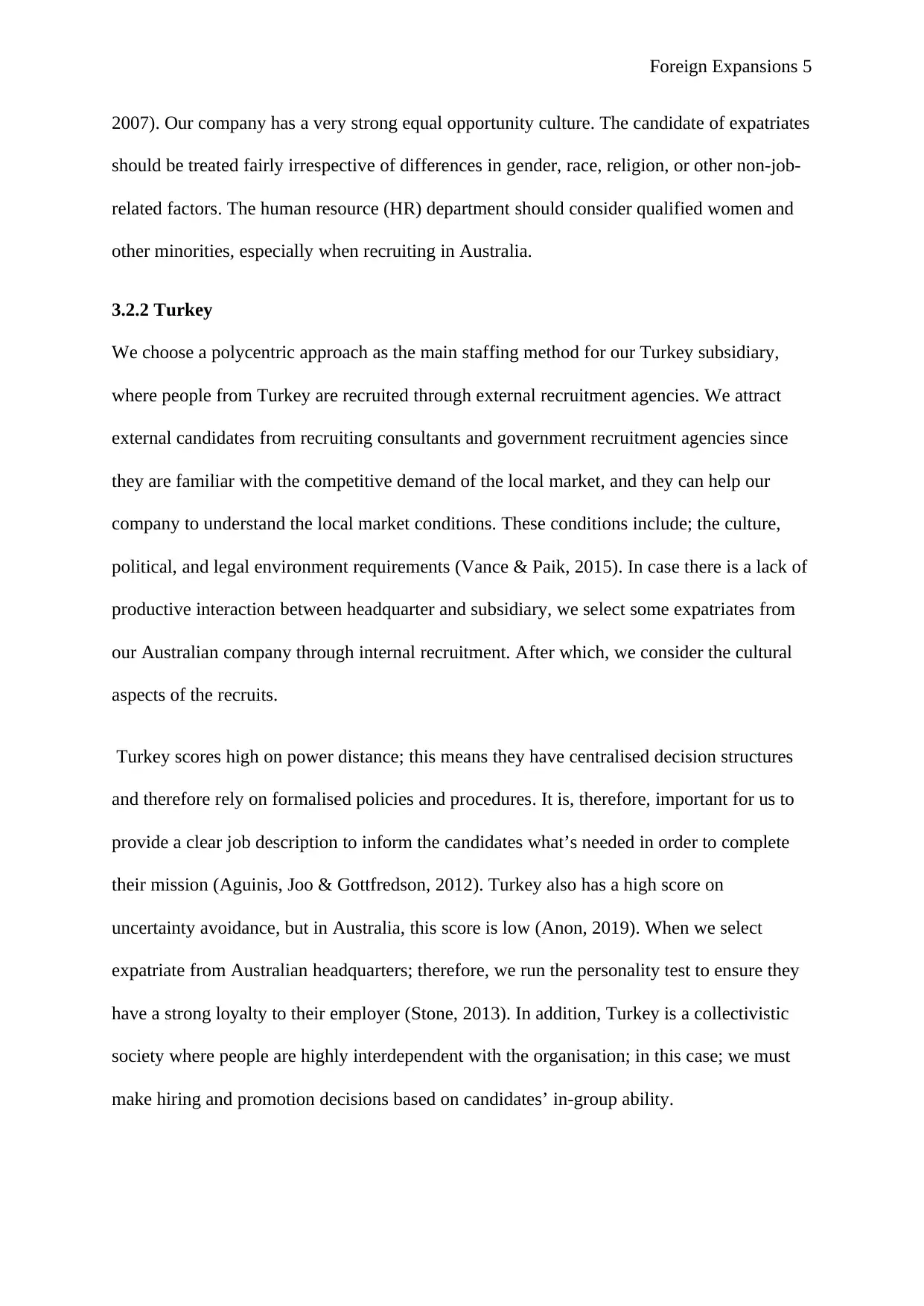
Foreign Expansions 5
2007). Our company has a very strong equal opportunity culture. The candidate of expatriates
should be treated fairly irrespective of differences in gender, race, religion, or other non-job-
related factors. The human resource (HR) department should consider qualified women and
other minorities, especially when recruiting in Australia.
3.2.2 Turkey
We choose a polycentric approach as the main staffing method for our Turkey subsidiary,
where people from Turkey are recruited through external recruitment agencies. We attract
external candidates from recruiting consultants and government recruitment agencies since
they are familiar with the competitive demand of the local market, and they can help our
company to understand the local market conditions. These conditions include; the culture,
political, and legal environment requirements (Vance & Paik, 2015). In case there is a lack of
productive interaction between headquarter and subsidiary, we select some expatriates from
our Australian company through internal recruitment. After which, we consider the cultural
aspects of the recruits.
Turkey scores high on power distance; this means they have centralised decision structures
and therefore rely on formalised policies and procedures. It is, therefore, important for us to
provide a clear job description to inform the candidates what’s needed in order to complete
their mission (Aguinis, Joo & Gottfredson, 2012). Turkey also has a high score on
uncertainty avoidance, but in Australia, this score is low (Anon, 2019). When we select
expatriate from Australian headquarters; therefore, we run the personality test to ensure they
have a strong loyalty to their employer (Stone, 2013). In addition, Turkey is a collectivistic
society where people are highly interdependent with the organisation; in this case; we must
make hiring and promotion decisions based on candidates’ in-group ability.
2007). Our company has a very strong equal opportunity culture. The candidate of expatriates
should be treated fairly irrespective of differences in gender, race, religion, or other non-job-
related factors. The human resource (HR) department should consider qualified women and
other minorities, especially when recruiting in Australia.
3.2.2 Turkey
We choose a polycentric approach as the main staffing method for our Turkey subsidiary,
where people from Turkey are recruited through external recruitment agencies. We attract
external candidates from recruiting consultants and government recruitment agencies since
they are familiar with the competitive demand of the local market, and they can help our
company to understand the local market conditions. These conditions include; the culture,
political, and legal environment requirements (Vance & Paik, 2015). In case there is a lack of
productive interaction between headquarter and subsidiary, we select some expatriates from
our Australian company through internal recruitment. After which, we consider the cultural
aspects of the recruits.
Turkey scores high on power distance; this means they have centralised decision structures
and therefore rely on formalised policies and procedures. It is, therefore, important for us to
provide a clear job description to inform the candidates what’s needed in order to complete
their mission (Aguinis, Joo & Gottfredson, 2012). Turkey also has a high score on
uncertainty avoidance, but in Australia, this score is low (Anon, 2019). When we select
expatriate from Australian headquarters; therefore, we run the personality test to ensure they
have a strong loyalty to their employer (Stone, 2013). In addition, Turkey is a collectivistic
society where people are highly interdependent with the organisation; in this case; we must
make hiring and promotion decisions based on candidates’ in-group ability.
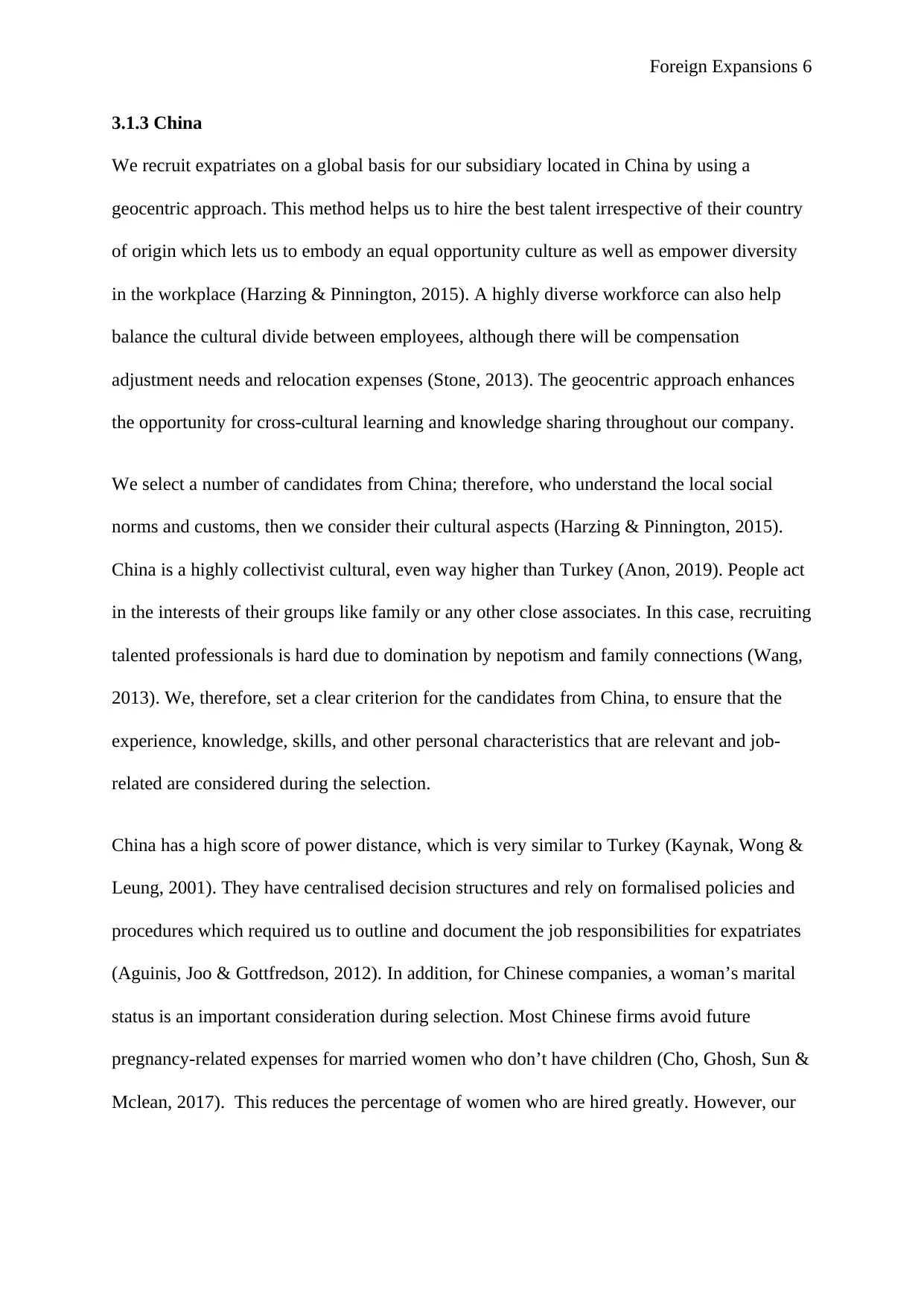
Foreign Expansions 6
3.1.3 China
We recruit expatriates on a global basis for our subsidiary located in China by using a
geocentric approach. This method helps us to hire the best talent irrespective of their country
of origin which lets us to embody an equal opportunity culture as well as empower diversity
in the workplace (Harzing & Pinnington, 2015). A highly diverse workforce can also help
balance the cultural divide between employees, although there will be compensation
adjustment needs and relocation expenses (Stone, 2013). The geocentric approach enhances
the opportunity for cross-cultural learning and knowledge sharing throughout our company.
We select a number of candidates from China; therefore, who understand the local social
norms and customs, then we consider their cultural aspects (Harzing & Pinnington, 2015).
China is a highly collectivist cultural, even way higher than Turkey (Anon, 2019). People act
in the interests of their groups like family or any other close associates. In this case, recruiting
talented professionals is hard due to domination by nepotism and family connections (Wang,
2013). We, therefore, set a clear criterion for the candidates from China, to ensure that the
experience, knowledge, skills, and other personal characteristics that are relevant and job-
related are considered during the selection.
China has a high score of power distance, which is very similar to Turkey (Kaynak, Wong &
Leung, 2001). They have centralised decision structures and rely on formalised policies and
procedures which required us to outline and document the job responsibilities for expatriates
(Aguinis, Joo & Gottfredson, 2012). In addition, for Chinese companies, a woman’s marital
status is an important consideration during selection. Most Chinese firms avoid future
pregnancy-related expenses for married women who don’t have children (Cho, Ghosh, Sun &
Mclean, 2017). This reduces the percentage of women who are hired greatly. However, our
3.1.3 China
We recruit expatriates on a global basis for our subsidiary located in China by using a
geocentric approach. This method helps us to hire the best talent irrespective of their country
of origin which lets us to embody an equal opportunity culture as well as empower diversity
in the workplace (Harzing & Pinnington, 2015). A highly diverse workforce can also help
balance the cultural divide between employees, although there will be compensation
adjustment needs and relocation expenses (Stone, 2013). The geocentric approach enhances
the opportunity for cross-cultural learning and knowledge sharing throughout our company.
We select a number of candidates from China; therefore, who understand the local social
norms and customs, then we consider their cultural aspects (Harzing & Pinnington, 2015).
China is a highly collectivist cultural, even way higher than Turkey (Anon, 2019). People act
in the interests of their groups like family or any other close associates. In this case, recruiting
talented professionals is hard due to domination by nepotism and family connections (Wang,
2013). We, therefore, set a clear criterion for the candidates from China, to ensure that the
experience, knowledge, skills, and other personal characteristics that are relevant and job-
related are considered during the selection.
China has a high score of power distance, which is very similar to Turkey (Kaynak, Wong &
Leung, 2001). They have centralised decision structures and rely on formalised policies and
procedures which required us to outline and document the job responsibilities for expatriates
(Aguinis, Joo & Gottfredson, 2012). In addition, for Chinese companies, a woman’s marital
status is an important consideration during selection. Most Chinese firms avoid future
pregnancy-related expenses for married women who don’t have children (Cho, Ghosh, Sun &
Mclean, 2017). This reduces the percentage of women who are hired greatly. However, our
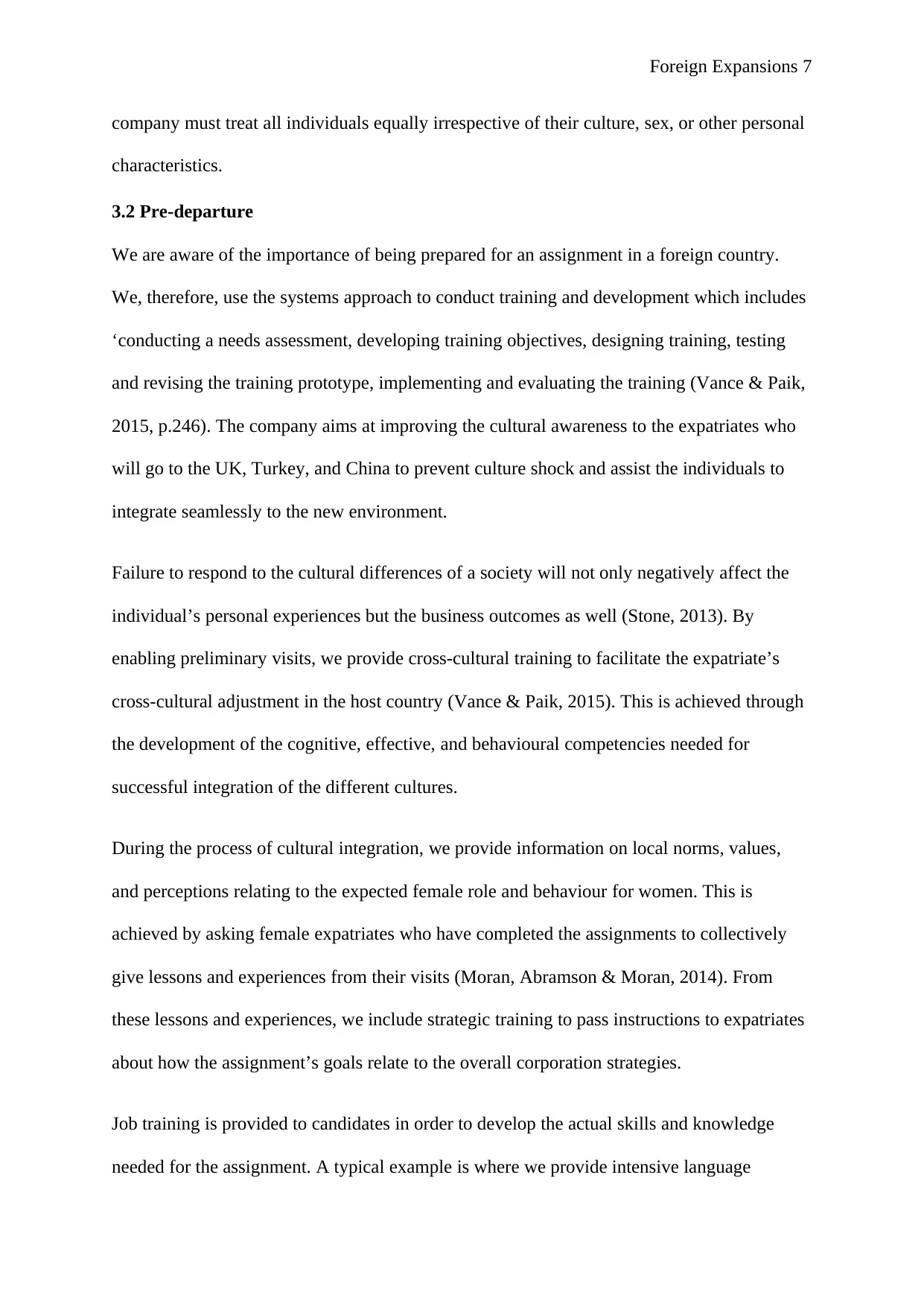
Foreign Expansions 7
company must treat all individuals equally irrespective of their culture, sex, or other personal
characteristics.
3.2 Pre-departure
We are aware of the importance of being prepared for an assignment in a foreign country.
We, therefore, use the systems approach to conduct training and development which includes
‘conducting a needs assessment, developing training objectives, designing training, testing
and revising the training prototype, implementing and evaluating the training (Vance & Paik,
2015, p.246). The company aims at improving the cultural awareness to the expatriates who
will go to the UK, Turkey, and China to prevent culture shock and assist the individuals to
integrate seamlessly to the new environment.
Failure to respond to the cultural differences of a society will not only negatively affect the
individual’s personal experiences but the business outcomes as well (Stone, 2013). By
enabling preliminary visits, we provide cross-cultural training to facilitate the expatriate’s
cross-cultural adjustment in the host country (Vance & Paik, 2015). This is achieved through
the development of the cognitive, effective, and behavioural competencies needed for
successful integration of the different cultures.
During the process of cultural integration, we provide information on local norms, values,
and perceptions relating to the expected female role and behaviour for women. This is
achieved by asking female expatriates who have completed the assignments to collectively
give lessons and experiences from their visits (Moran, Abramson & Moran, 2014). From
these lessons and experiences, we include strategic training to pass instructions to expatriates
about how the assignment’s goals relate to the overall corporation strategies.
Job training is provided to candidates in order to develop the actual skills and knowledge
needed for the assignment. A typical example is where we provide intensive language
company must treat all individuals equally irrespective of their culture, sex, or other personal
characteristics.
3.2 Pre-departure
We are aware of the importance of being prepared for an assignment in a foreign country.
We, therefore, use the systems approach to conduct training and development which includes
‘conducting a needs assessment, developing training objectives, designing training, testing
and revising the training prototype, implementing and evaluating the training (Vance & Paik,
2015, p.246). The company aims at improving the cultural awareness to the expatriates who
will go to the UK, Turkey, and China to prevent culture shock and assist the individuals to
integrate seamlessly to the new environment.
Failure to respond to the cultural differences of a society will not only negatively affect the
individual’s personal experiences but the business outcomes as well (Stone, 2013). By
enabling preliminary visits, we provide cross-cultural training to facilitate the expatriate’s
cross-cultural adjustment in the host country (Vance & Paik, 2015). This is achieved through
the development of the cognitive, effective, and behavioural competencies needed for
successful integration of the different cultures.
During the process of cultural integration, we provide information on local norms, values,
and perceptions relating to the expected female role and behaviour for women. This is
achieved by asking female expatriates who have completed the assignments to collectively
give lessons and experiences from their visits (Moran, Abramson & Moran, 2014). From
these lessons and experiences, we include strategic training to pass instructions to expatriates
about how the assignment’s goals relate to the overall corporation strategies.
Job training is provided to candidates in order to develop the actual skills and knowledge
needed for the assignment. A typical example is where we provide intensive language
Paraphrase This Document
Need a fresh take? Get an instant paraphrase of this document with our AI Paraphraser
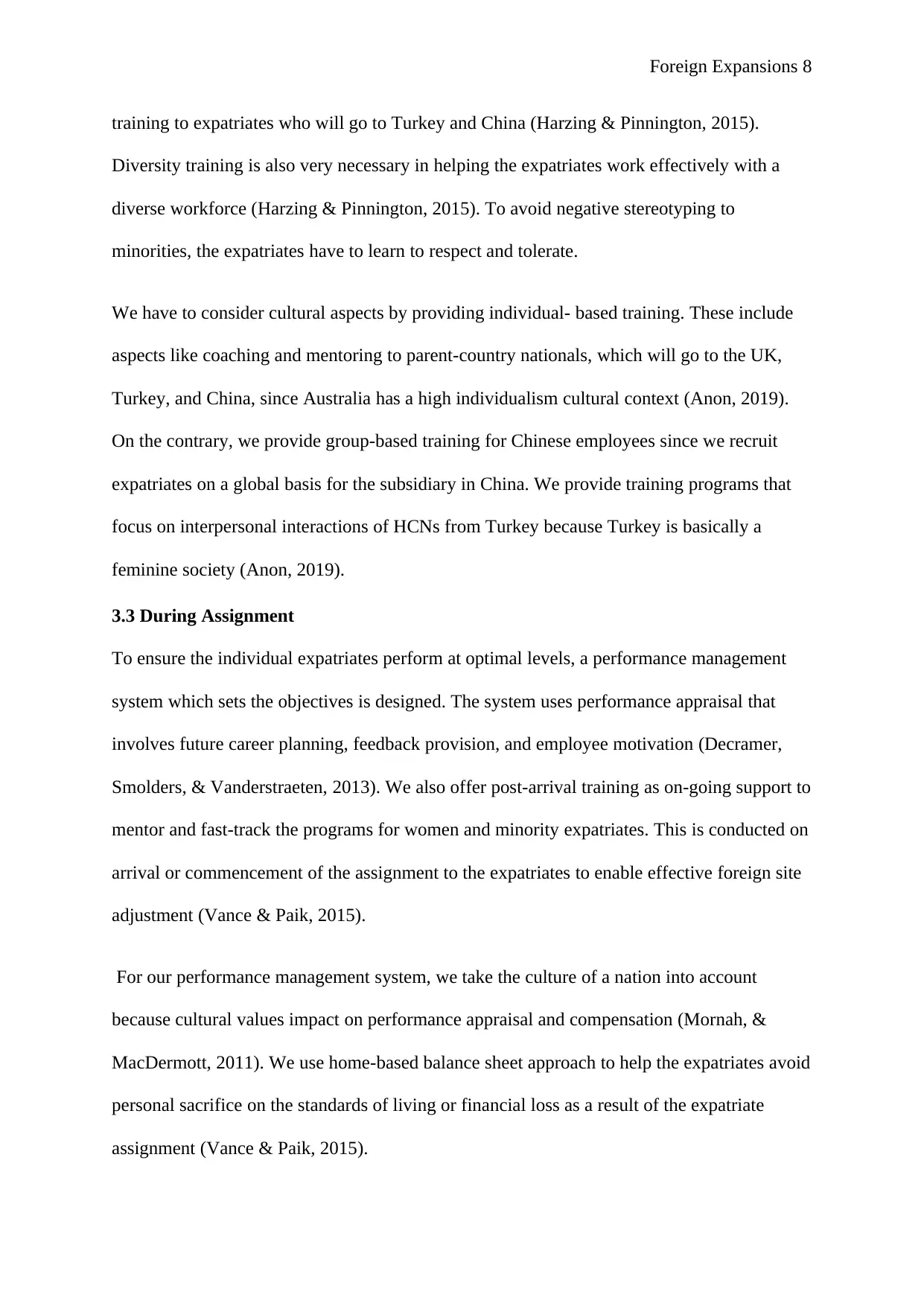
Foreign Expansions 8
training to expatriates who will go to Turkey and China (Harzing & Pinnington, 2015).
Diversity training is also very necessary in helping the expatriates work effectively with a
diverse workforce (Harzing & Pinnington, 2015). To avoid negative stereotyping to
minorities, the expatriates have to learn to respect and tolerate.
We have to consider cultural aspects by providing individual- based training. These include
aspects like coaching and mentoring to parent-country nationals, which will go to the UK,
Turkey, and China, since Australia has a high individualism cultural context (Anon, 2019).
On the contrary, we provide group-based training for Chinese employees since we recruit
expatriates on a global basis for the subsidiary in China. We provide training programs that
focus on interpersonal interactions of HCNs from Turkey because Turkey is basically a
feminine society (Anon, 2019).
3.3 During Assignment
To ensure the individual expatriates perform at optimal levels, a performance management
system which sets the objectives is designed. The system uses performance appraisal that
involves future career planning, feedback provision, and employee motivation (Decramer,
Smolders, & Vanderstraeten, 2013). We also offer post-arrival training as on-going support to
mentor and fast-track the programs for women and minority expatriates. This is conducted on
arrival or commencement of the assignment to the expatriates to enable effective foreign site
adjustment (Vance & Paik, 2015).
For our performance management system, we take the culture of a nation into account
because cultural values impact on performance appraisal and compensation (Mornah, &
MacDermott, 2011). We use home-based balance sheet approach to help the expatriates avoid
personal sacrifice on the standards of living or financial loss as a result of the expatriate
assignment (Vance & Paik, 2015).
training to expatriates who will go to Turkey and China (Harzing & Pinnington, 2015).
Diversity training is also very necessary in helping the expatriates work effectively with a
diverse workforce (Harzing & Pinnington, 2015). To avoid negative stereotyping to
minorities, the expatriates have to learn to respect and tolerate.
We have to consider cultural aspects by providing individual- based training. These include
aspects like coaching and mentoring to parent-country nationals, which will go to the UK,
Turkey, and China, since Australia has a high individualism cultural context (Anon, 2019).
On the contrary, we provide group-based training for Chinese employees since we recruit
expatriates on a global basis for the subsidiary in China. We provide training programs that
focus on interpersonal interactions of HCNs from Turkey because Turkey is basically a
feminine society (Anon, 2019).
3.3 During Assignment
To ensure the individual expatriates perform at optimal levels, a performance management
system which sets the objectives is designed. The system uses performance appraisal that
involves future career planning, feedback provision, and employee motivation (Decramer,
Smolders, & Vanderstraeten, 2013). We also offer post-arrival training as on-going support to
mentor and fast-track the programs for women and minority expatriates. This is conducted on
arrival or commencement of the assignment to the expatriates to enable effective foreign site
adjustment (Vance & Paik, 2015).
For our performance management system, we take the culture of a nation into account
because cultural values impact on performance appraisal and compensation (Mornah, &
MacDermott, 2011). We use home-based balance sheet approach to help the expatriates avoid
personal sacrifice on the standards of living or financial loss as a result of the expatriate
assignment (Vance & Paik, 2015).
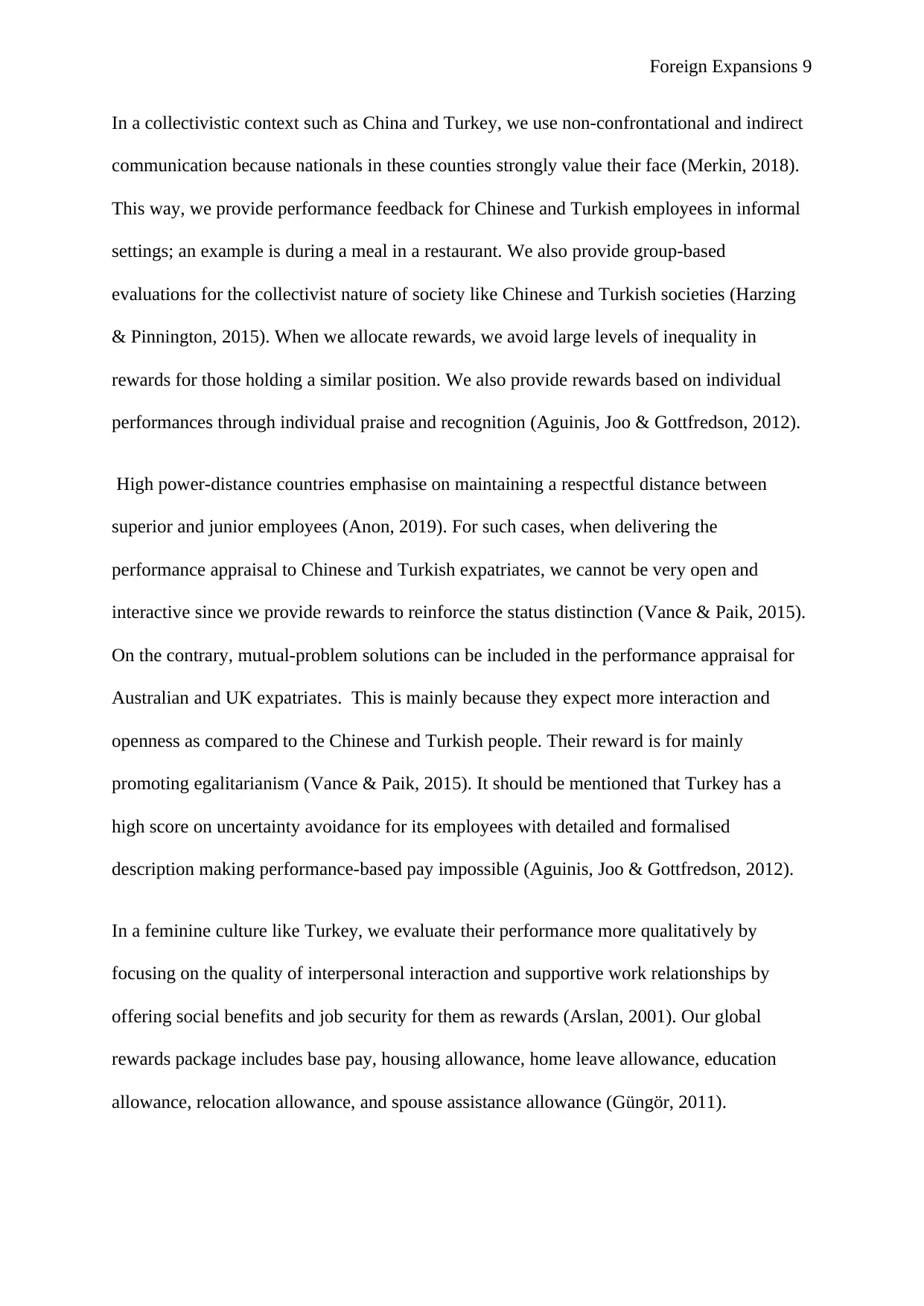
Foreign Expansions 9
In a collectivistic context such as China and Turkey, we use non-confrontational and indirect
communication because nationals in these counties strongly value their face (Merkin, 2018).
This way, we provide performance feedback for Chinese and Turkish employees in informal
settings; an example is during a meal in a restaurant. We also provide group-based
evaluations for the collectivist nature of society like Chinese and Turkish societies (Harzing
& Pinnington, 2015). When we allocate rewards, we avoid large levels of inequality in
rewards for those holding a similar position. We also provide rewards based on individual
performances through individual praise and recognition (Aguinis, Joo & Gottfredson, 2012).
High power-distance countries emphasise on maintaining a respectful distance between
superior and junior employees (Anon, 2019). For such cases, when delivering the
performance appraisal to Chinese and Turkish expatriates, we cannot be very open and
interactive since we provide rewards to reinforce the status distinction (Vance & Paik, 2015).
On the contrary, mutual-problem solutions can be included in the performance appraisal for
Australian and UK expatriates. This is mainly because they expect more interaction and
openness as compared to the Chinese and Turkish people. Their reward is for mainly
promoting egalitarianism (Vance & Paik, 2015). It should be mentioned that Turkey has a
high score on uncertainty avoidance for its employees with detailed and formalised
description making performance-based pay impossible (Aguinis, Joo & Gottfredson, 2012).
In a feminine culture like Turkey, we evaluate their performance more qualitatively by
focusing on the quality of interpersonal interaction and supportive work relationships by
offering social benefits and job security for them as rewards (Arslan, 2001). Our global
rewards package includes base pay, housing allowance, home leave allowance, education
allowance, relocation allowance, and spouse assistance allowance (Güngör, 2011).
In a collectivistic context such as China and Turkey, we use non-confrontational and indirect
communication because nationals in these counties strongly value their face (Merkin, 2018).
This way, we provide performance feedback for Chinese and Turkish employees in informal
settings; an example is during a meal in a restaurant. We also provide group-based
evaluations for the collectivist nature of society like Chinese and Turkish societies (Harzing
& Pinnington, 2015). When we allocate rewards, we avoid large levels of inequality in
rewards for those holding a similar position. We also provide rewards based on individual
performances through individual praise and recognition (Aguinis, Joo & Gottfredson, 2012).
High power-distance countries emphasise on maintaining a respectful distance between
superior and junior employees (Anon, 2019). For such cases, when delivering the
performance appraisal to Chinese and Turkish expatriates, we cannot be very open and
interactive since we provide rewards to reinforce the status distinction (Vance & Paik, 2015).
On the contrary, mutual-problem solutions can be included in the performance appraisal for
Australian and UK expatriates. This is mainly because they expect more interaction and
openness as compared to the Chinese and Turkish people. Their reward is for mainly
promoting egalitarianism (Vance & Paik, 2015). It should be mentioned that Turkey has a
high score on uncertainty avoidance for its employees with detailed and formalised
description making performance-based pay impossible (Aguinis, Joo & Gottfredson, 2012).
In a feminine culture like Turkey, we evaluate their performance more qualitatively by
focusing on the quality of interpersonal interaction and supportive work relationships by
offering social benefits and job security for them as rewards (Arslan, 2001). Our global
rewards package includes base pay, housing allowance, home leave allowance, education
allowance, relocation allowance, and spouse assistance allowance (Güngör, 2011).
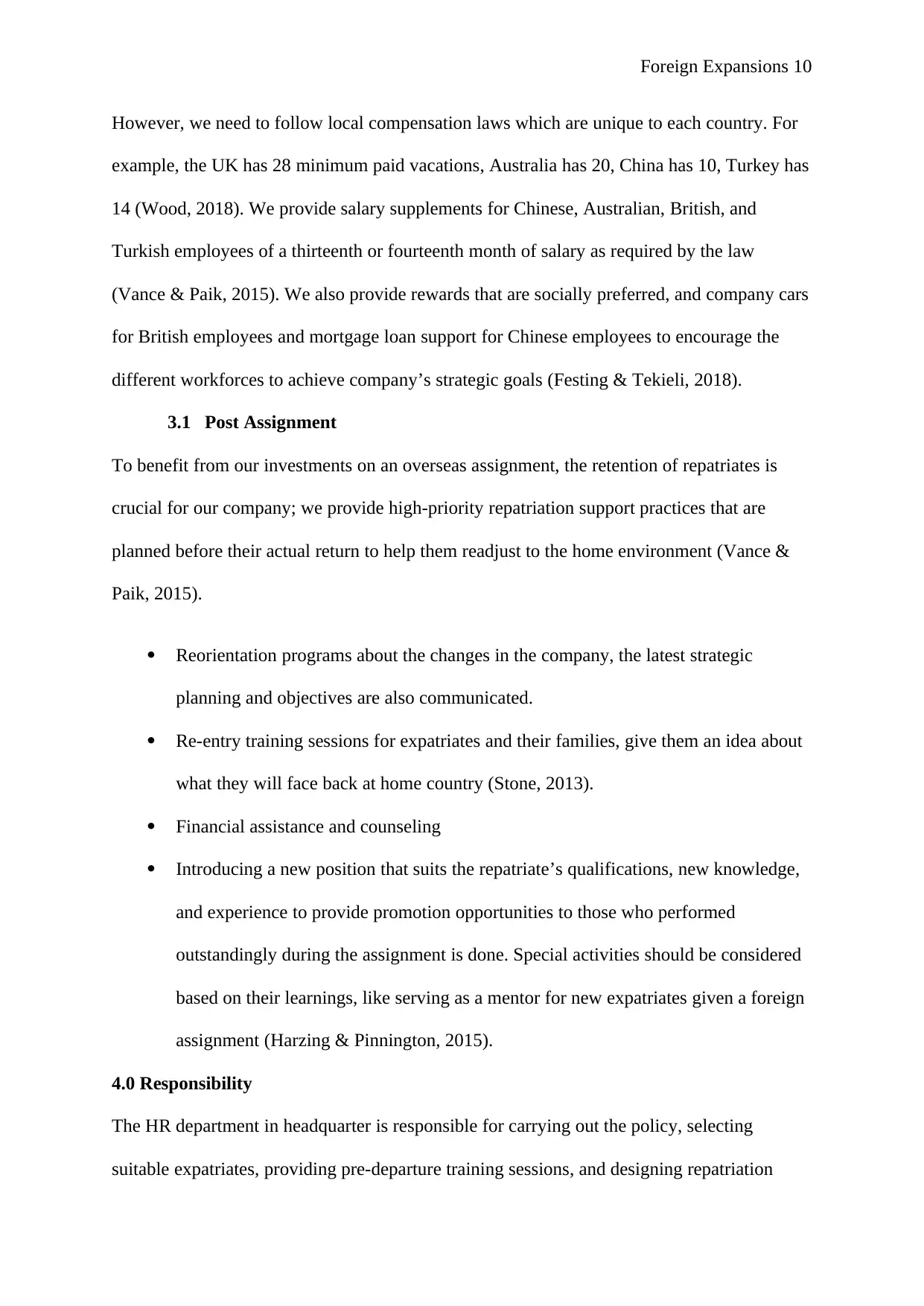
Foreign Expansions 10
However, we need to follow local compensation laws which are unique to each country. For
example, the UK has 28 minimum paid vacations, Australia has 20, China has 10, Turkey has
14 (Wood, 2018). We provide salary supplements for Chinese, Australian, British, and
Turkish employees of a thirteenth or fourteenth month of salary as required by the law
(Vance & Paik, 2015). We also provide rewards that are socially preferred, and company cars
for British employees and mortgage loan support for Chinese employees to encourage the
different workforces to achieve company’s strategic goals (Festing & Tekieli, 2018).
3.1 Post Assignment
To benefit from our investments on an overseas assignment, the retention of repatriates is
crucial for our company; we provide high-priority repatriation support practices that are
planned before their actual return to help them readjust to the home environment (Vance &
Paik, 2015).
Reorientation programs about the changes in the company, the latest strategic
planning and objectives are also communicated.
Re-entry training sessions for expatriates and their families, give them an idea about
what they will face back at home country (Stone, 2013).
Financial assistance and counseling
Introducing a new position that suits the repatriate’s qualifications, new knowledge,
and experience to provide promotion opportunities to those who performed
outstandingly during the assignment is done. Special activities should be considered
based on their learnings, like serving as a mentor for new expatriates given a foreign
assignment (Harzing & Pinnington, 2015).
4.0 Responsibility
The HR department in headquarter is responsible for carrying out the policy, selecting
suitable expatriates, providing pre-departure training sessions, and designing repatriation
However, we need to follow local compensation laws which are unique to each country. For
example, the UK has 28 minimum paid vacations, Australia has 20, China has 10, Turkey has
14 (Wood, 2018). We provide salary supplements for Chinese, Australian, British, and
Turkish employees of a thirteenth or fourteenth month of salary as required by the law
(Vance & Paik, 2015). We also provide rewards that are socially preferred, and company cars
for British employees and mortgage loan support for Chinese employees to encourage the
different workforces to achieve company’s strategic goals (Festing & Tekieli, 2018).
3.1 Post Assignment
To benefit from our investments on an overseas assignment, the retention of repatriates is
crucial for our company; we provide high-priority repatriation support practices that are
planned before their actual return to help them readjust to the home environment (Vance &
Paik, 2015).
Reorientation programs about the changes in the company, the latest strategic
planning and objectives are also communicated.
Re-entry training sessions for expatriates and their families, give them an idea about
what they will face back at home country (Stone, 2013).
Financial assistance and counseling
Introducing a new position that suits the repatriate’s qualifications, new knowledge,
and experience to provide promotion opportunities to those who performed
outstandingly during the assignment is done. Special activities should be considered
based on their learnings, like serving as a mentor for new expatriates given a foreign
assignment (Harzing & Pinnington, 2015).
4.0 Responsibility
The HR department in headquarter is responsible for carrying out the policy, selecting
suitable expatriates, providing pre-departure training sessions, and designing repatriation
Secure Best Marks with AI Grader
Need help grading? Try our AI Grader for instant feedback on your assignments.
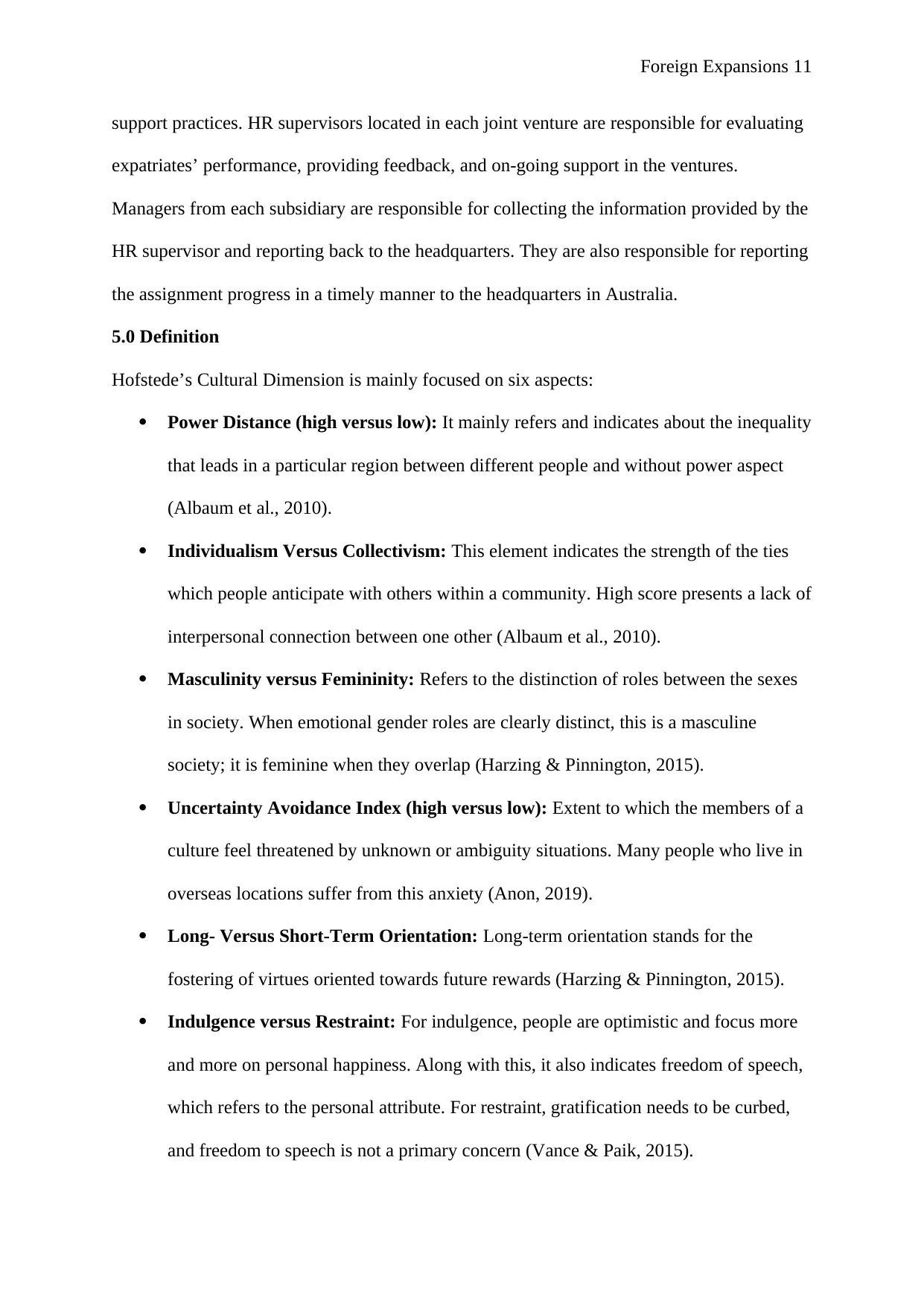
Foreign Expansions 11
support practices. HR supervisors located in each joint venture are responsible for evaluating
expatriates’ performance, providing feedback, and on-going support in the ventures.
Managers from each subsidiary are responsible for collecting the information provided by the
HR supervisor and reporting back to the headquarters. They are also responsible for reporting
the assignment progress in a timely manner to the headquarters in Australia.
5.0 Definition
Hofstede’s Cultural Dimension is mainly focused on six aspects:
Power Distance (high versus low): It mainly refers and indicates about the inequality
that leads in a particular region between different people and without power aspect
(Albaum et al., 2010).
Individualism Versus Collectivism: This element indicates the strength of the ties
which people anticipate with others within a community. High score presents a lack of
interpersonal connection between one other (Albaum et al., 2010).
Masculinity versus Femininity: Refers to the distinction of roles between the sexes
in society. When emotional gender roles are clearly distinct, this is a masculine
society; it is feminine when they overlap (Harzing & Pinnington, 2015).
Uncertainty Avoidance Index (high versus low): Extent to which the members of a
culture feel threatened by unknown or ambiguity situations. Many people who live in
overseas locations suffer from this anxiety (Anon, 2019).
Long- Versus Short-Term Orientation: Long-term orientation stands for the
fostering of virtues oriented towards future rewards (Harzing & Pinnington, 2015).
Indulgence versus Restraint: For indulgence, people are optimistic and focus more
and more on personal happiness. Along with this, it also indicates freedom of speech,
which refers to the personal attribute. For restraint, gratification needs to be curbed,
and freedom to speech is not a primary concern (Vance & Paik, 2015).
support practices. HR supervisors located in each joint venture are responsible for evaluating
expatriates’ performance, providing feedback, and on-going support in the ventures.
Managers from each subsidiary are responsible for collecting the information provided by the
HR supervisor and reporting back to the headquarters. They are also responsible for reporting
the assignment progress in a timely manner to the headquarters in Australia.
5.0 Definition
Hofstede’s Cultural Dimension is mainly focused on six aspects:
Power Distance (high versus low): It mainly refers and indicates about the inequality
that leads in a particular region between different people and without power aspect
(Albaum et al., 2010).
Individualism Versus Collectivism: This element indicates the strength of the ties
which people anticipate with others within a community. High score presents a lack of
interpersonal connection between one other (Albaum et al., 2010).
Masculinity versus Femininity: Refers to the distinction of roles between the sexes
in society. When emotional gender roles are clearly distinct, this is a masculine
society; it is feminine when they overlap (Harzing & Pinnington, 2015).
Uncertainty Avoidance Index (high versus low): Extent to which the members of a
culture feel threatened by unknown or ambiguity situations. Many people who live in
overseas locations suffer from this anxiety (Anon, 2019).
Long- Versus Short-Term Orientation: Long-term orientation stands for the
fostering of virtues oriented towards future rewards (Harzing & Pinnington, 2015).
Indulgence versus Restraint: For indulgence, people are optimistic and focus more
and more on personal happiness. Along with this, it also indicates freedom of speech,
which refers to the personal attribute. For restraint, gratification needs to be curbed,
and freedom to speech is not a primary concern (Vance & Paik, 2015).
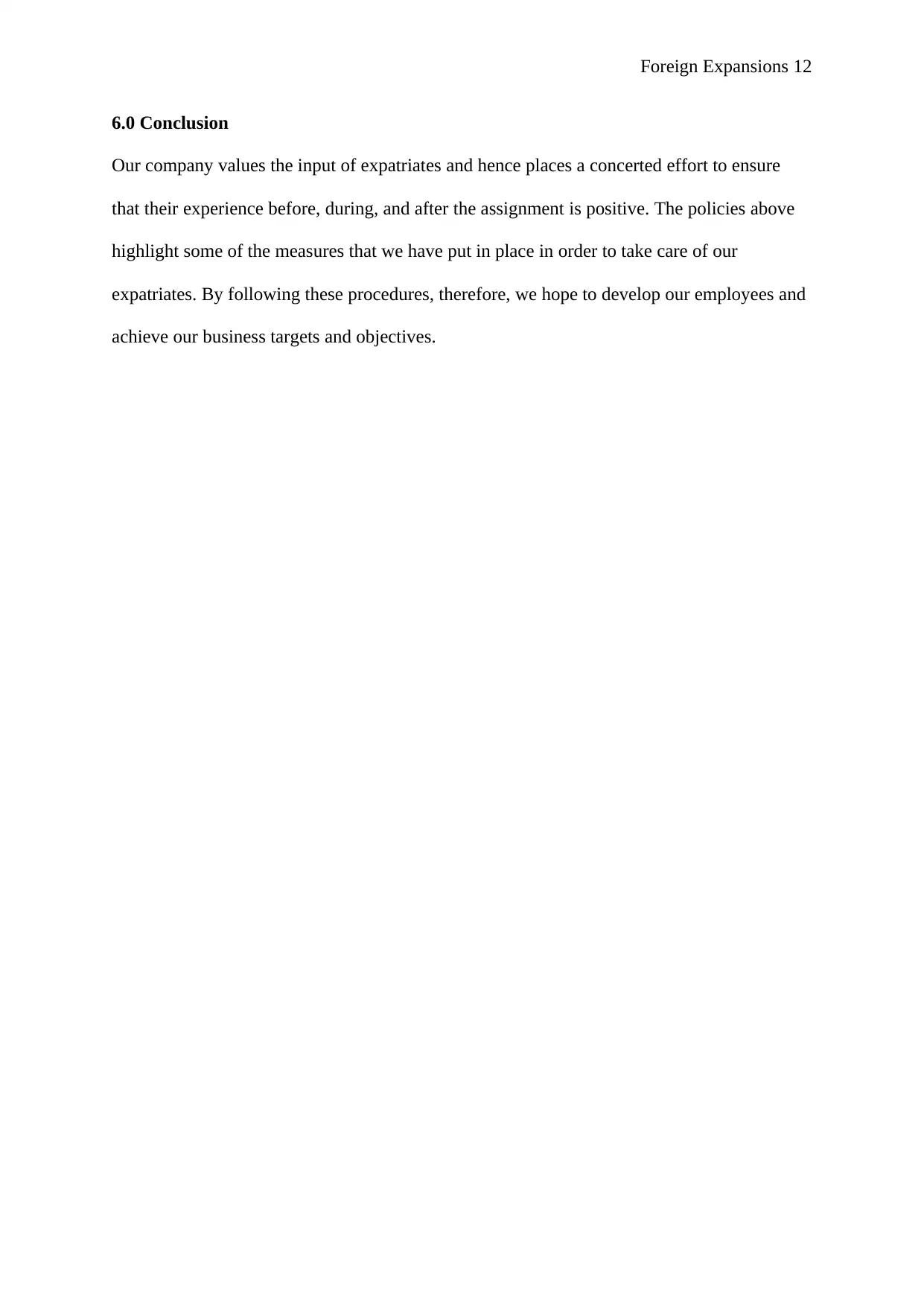
Foreign Expansions 12
6.0 Conclusion
Our company values the input of expatriates and hence places a concerted effort to ensure
that their experience before, during, and after the assignment is positive. The policies above
highlight some of the measures that we have put in place in order to take care of our
expatriates. By following these procedures, therefore, we hope to develop our employees and
achieve our business targets and objectives.
6.0 Conclusion
Our company values the input of expatriates and hence places a concerted effort to ensure
that their experience before, during, and after the assignment is positive. The policies above
highlight some of the measures that we have put in place in order to take care of our
expatriates. By following these procedures, therefore, we hope to develop our employees and
achieve our business targets and objectives.
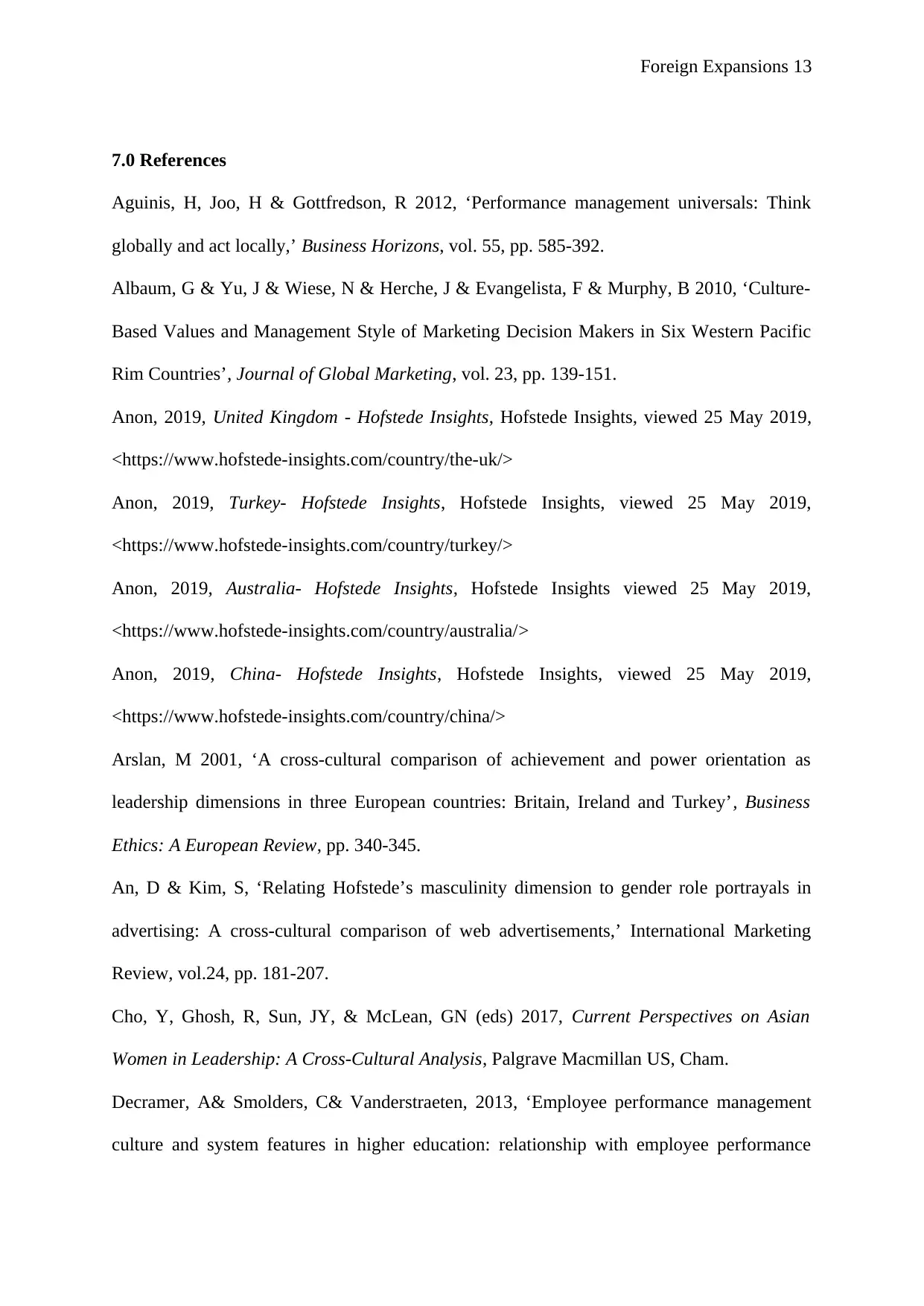
Foreign Expansions 13
7.0 References
Aguinis, H, Joo, H & Gottfredson, R 2012, ‘Performance management universals: Think
globally and act locally,’ Business Horizons, vol. 55, pp. 585-392.
Albaum, G & Yu, J & Wiese, N & Herche, J & Evangelista, F & Murphy, B 2010, ‘Culture-
Based Values and Management Style of Marketing Decision Makers in Six Western Pacific
Rim Countries’, Journal of Global Marketing, vol. 23, pp. 139-151.
Anon, 2019, United Kingdom - Hofstede Insights, Hofstede Insights, viewed 25 May 2019,
<https://www.hofstede-insights.com/country/the-uk/>
Anon, 2019, Turkey- Hofstede Insights, Hofstede Insights, viewed 25 May 2019,
<https://www.hofstede-insights.com/country/turkey/>
Anon, 2019, Australia- Hofstede Insights, Hofstede Insights viewed 25 May 2019,
<https://www.hofstede-insights.com/country/australia/>
Anon, 2019, China- Hofstede Insights, Hofstede Insights, viewed 25 May 2019,
<https://www.hofstede-insights.com/country/china/>
Arslan, M 2001, ‘A cross‐cultural comparison of achievement and power orientation as
leadership dimensions in three European countries: Britain, Ireland and Turkey’, Business
Ethics: A European Review, pp. 340-345.
An, D & Kim, S, ‘Relating Hofstede’s masculinity dimension to gender role portrayals in
advertising: A cross-cultural comparison of web advertisements,’ International Marketing
Review, vol.24, pp. 181-207.
Cho, Y, Ghosh, R, Sun, JY, & McLean, GN (eds) 2017, Current Perspectives on Asian
Women in Leadership: A Cross-Cultural Analysis, Palgrave Macmillan US, Cham.
Decramer, A& Smolders, C& Vanderstraeten, 2013, ‘Employee performance management
culture and system features in higher education: relationship with employee performance
7.0 References
Aguinis, H, Joo, H & Gottfredson, R 2012, ‘Performance management universals: Think
globally and act locally,’ Business Horizons, vol. 55, pp. 585-392.
Albaum, G & Yu, J & Wiese, N & Herche, J & Evangelista, F & Murphy, B 2010, ‘Culture-
Based Values and Management Style of Marketing Decision Makers in Six Western Pacific
Rim Countries’, Journal of Global Marketing, vol. 23, pp. 139-151.
Anon, 2019, United Kingdom - Hofstede Insights, Hofstede Insights, viewed 25 May 2019,
<https://www.hofstede-insights.com/country/the-uk/>
Anon, 2019, Turkey- Hofstede Insights, Hofstede Insights, viewed 25 May 2019,
<https://www.hofstede-insights.com/country/turkey/>
Anon, 2019, Australia- Hofstede Insights, Hofstede Insights viewed 25 May 2019,
<https://www.hofstede-insights.com/country/australia/>
Anon, 2019, China- Hofstede Insights, Hofstede Insights, viewed 25 May 2019,
<https://www.hofstede-insights.com/country/china/>
Arslan, M 2001, ‘A cross‐cultural comparison of achievement and power orientation as
leadership dimensions in three European countries: Britain, Ireland and Turkey’, Business
Ethics: A European Review, pp. 340-345.
An, D & Kim, S, ‘Relating Hofstede’s masculinity dimension to gender role portrayals in
advertising: A cross-cultural comparison of web advertisements,’ International Marketing
Review, vol.24, pp. 181-207.
Cho, Y, Ghosh, R, Sun, JY, & McLean, GN (eds) 2017, Current Perspectives on Asian
Women in Leadership: A Cross-Cultural Analysis, Palgrave Macmillan US, Cham.
Decramer, A& Smolders, C& Vanderstraeten, 2013, ‘Employee performance management
culture and system features in higher education: relationship with employee performance
Paraphrase This Document
Need a fresh take? Get an instant paraphrase of this document with our AI Paraphraser
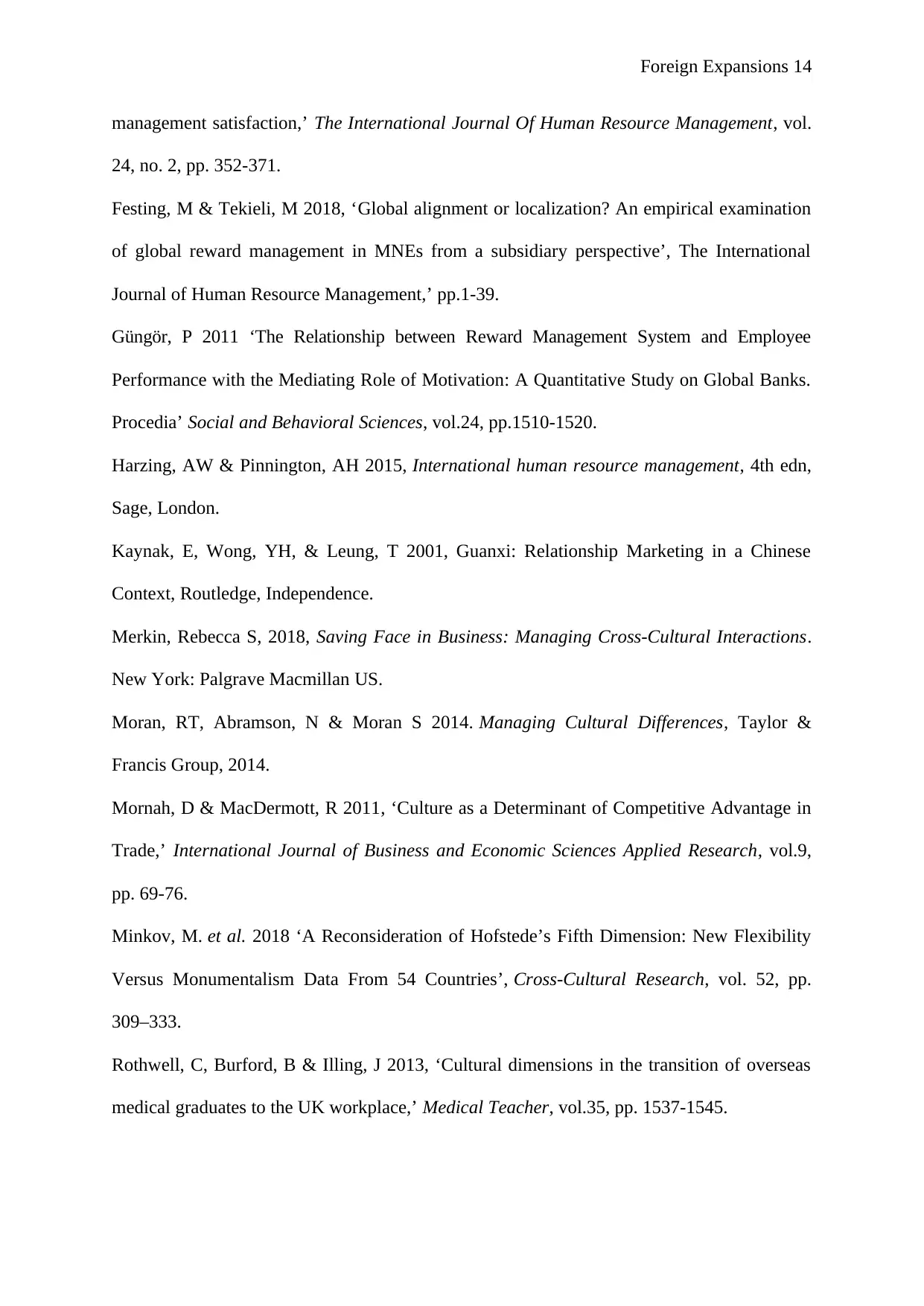
Foreign Expansions 14
management satisfaction,’ The International Journal Of Human Resource Management, vol.
24, no. 2, pp. 352-371.
Festing, M & Tekieli, M 2018, ‘Global alignment or localization? An empirical examination
of global reward management in MNEs from a subsidiary perspective’, The International
Journal of Human Resource Management,’ pp.1-39.
Güngör, P 2011 ‘The Relationship between Reward Management System and Employee
Performance with the Mediating Role of Motivation: A Quantitative Study on Global Banks.
Procedia’ Social and Behavioral Sciences, vol.24, pp.1510-1520.
Harzing, AW & Pinnington, AH 2015, International human resource management, 4th edn,
Sage, London.
Kaynak, E, Wong, YH, & Leung, T 2001, Guanxi: Relationship Marketing in a Chinese
Context, Routledge, Independence.
Merkin, Rebecca S, 2018, Saving Face in Business: Managing Cross-Cultural Interactions.
New York: Palgrave Macmillan US.
Moran, RT, Abramson, N & Moran S 2014. Managing Cultural Differences, Taylor &
Francis Group, 2014.
Mornah, D & MacDermott, R 2011, ‘Culture as a Determinant of Competitive Advantage in
Trade,’ International Journal of Business and Economic Sciences Applied Research, vol.9,
pp. 69-76.
Minkov, M. et al. 2018 ‘A Reconsideration of Hofstede’s Fifth Dimension: New Flexibility
Versus Monumentalism Data From 54 Countries’, Cross-Cultural Research, vol. 52, pp.
309–333.
Rothwell, C, Burford, B & Illing, J 2013, ‘Cultural dimensions in the transition of overseas
medical graduates to the UK workplace,’ Medical Teacher, vol.35, pp. 1537-1545.
management satisfaction,’ The International Journal Of Human Resource Management, vol.
24, no. 2, pp. 352-371.
Festing, M & Tekieli, M 2018, ‘Global alignment or localization? An empirical examination
of global reward management in MNEs from a subsidiary perspective’, The International
Journal of Human Resource Management,’ pp.1-39.
Güngör, P 2011 ‘The Relationship between Reward Management System and Employee
Performance with the Mediating Role of Motivation: A Quantitative Study on Global Banks.
Procedia’ Social and Behavioral Sciences, vol.24, pp.1510-1520.
Harzing, AW & Pinnington, AH 2015, International human resource management, 4th edn,
Sage, London.
Kaynak, E, Wong, YH, & Leung, T 2001, Guanxi: Relationship Marketing in a Chinese
Context, Routledge, Independence.
Merkin, Rebecca S, 2018, Saving Face in Business: Managing Cross-Cultural Interactions.
New York: Palgrave Macmillan US.
Moran, RT, Abramson, N & Moran S 2014. Managing Cultural Differences, Taylor &
Francis Group, 2014.
Mornah, D & MacDermott, R 2011, ‘Culture as a Determinant of Competitive Advantage in
Trade,’ International Journal of Business and Economic Sciences Applied Research, vol.9,
pp. 69-76.
Minkov, M. et al. 2018 ‘A Reconsideration of Hofstede’s Fifth Dimension: New Flexibility
Versus Monumentalism Data From 54 Countries’, Cross-Cultural Research, vol. 52, pp.
309–333.
Rothwell, C, Burford, B & Illing, J 2013, ‘Cultural dimensions in the transition of overseas
medical graduates to the UK workplace,’ Medical Teacher, vol.35, pp. 1537-1545.
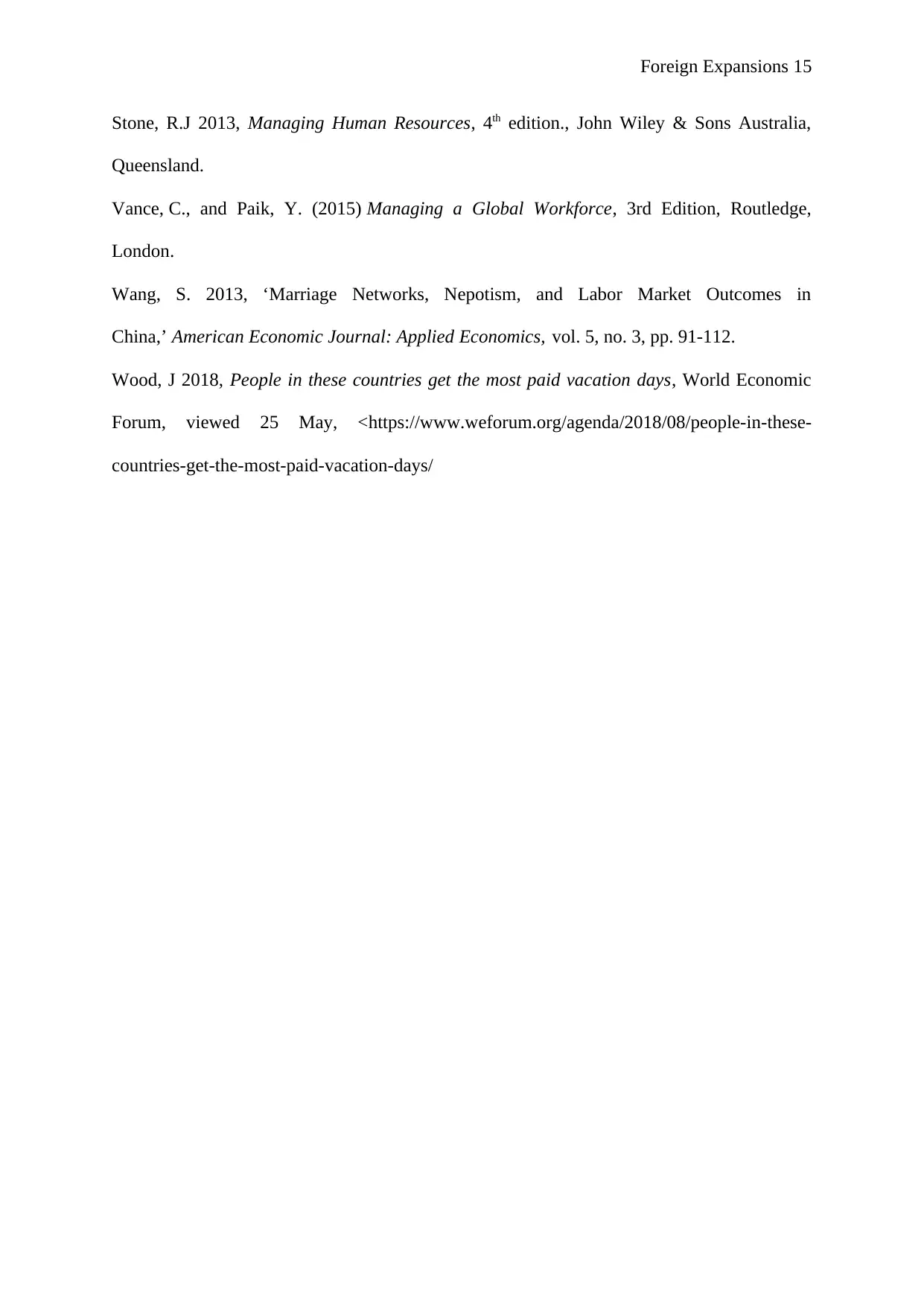
Foreign Expansions 15
Stone, R.J 2013, Managing Human Resources, 4th edition., John Wiley & Sons Australia,
Queensland.
Vance, C., and Paik, Y. (2015) Managing a Global Workforce, 3rd Edition, Routledge,
London.
Wang, S. 2013, ‘Marriage Networks, Nepotism, and Labor Market Outcomes in
China,’ American Economic Journal: Applied Economics, vol. 5, no. 3, pp. 91-112.
Wood, J 2018, People in these countries get the most paid vacation days, World Economic
Forum, viewed 25 May, <https://www.weforum.org/agenda/2018/08/people-in-these-
countries-get-the-most-paid-vacation-days/
Stone, R.J 2013, Managing Human Resources, 4th edition., John Wiley & Sons Australia,
Queensland.
Vance, C., and Paik, Y. (2015) Managing a Global Workforce, 3rd Edition, Routledge,
London.
Wang, S. 2013, ‘Marriage Networks, Nepotism, and Labor Market Outcomes in
China,’ American Economic Journal: Applied Economics, vol. 5, no. 3, pp. 91-112.
Wood, J 2018, People in these countries get the most paid vacation days, World Economic
Forum, viewed 25 May, <https://www.weforum.org/agenda/2018/08/people-in-these-
countries-get-the-most-paid-vacation-days/
1 out of 15
Your All-in-One AI-Powered Toolkit for Academic Success.
+13062052269
info@desklib.com
Available 24*7 on WhatsApp / Email
![[object Object]](/_next/static/media/star-bottom.7253800d.svg)
Unlock your academic potential
© 2024 | Zucol Services PVT LTD | All rights reserved.

